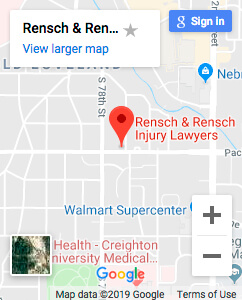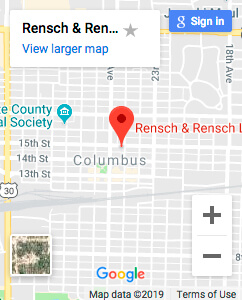Helmet Safety: Know the Risk Factors
 It’s too hot. It messes up my hair. It’s not comfortable. It looks goofy. I’m not going to fall, so I don’t need one. Those are all reasons people give for not wearing a helmet to ski, snowboard, ride a bike, scooter or motorcycle.
It’s too hot. It messes up my hair. It’s not comfortable. It looks goofy. I’m not going to fall, so I don’t need one. Those are all reasons people give for not wearing a helmet to ski, snowboard, ride a bike, scooter or motorcycle.
“It’s a rule at my house that if you’re riding anything with wheels, you always wear a helmet,” said Omaha Accident Attorney, Sean Rensch, the father of two young girls.
Rensch and his law partner and father, Richard Rensch, have a combined 45 years experience fighting for the rights of injured Nebraskans and Iowans.
With the Winter Games just around the corner and the recent frigid weather, we’re seeing an increasing trend in the use of helmets for winter sports at the nearby ski hill in Crescent, Iowa and on mountain slopes around the country.
Sean and Dick have handled countless cases of head trauma over the years and traumatic brain injuries from personal injury accidents caused by the negligence of another person.
“Your brain is the single most important organ in your body and it can’t be replaced. So it has to be your top priority to keep it safe,” said Richard Rensch.
Rensch, who rides a Harley Davidson motorcycle, wears a helmet when he rides, though he believes adult motorcyclists should have the option of not wearing a helmet if they so choose.
Rensch said that many motorcyclists are passionate when it comes to the subject of states mandating helmet use. There are numerous issues to be considered.
The fact that states are about evenly divided on mandating helmet use laws, is indicative of the split of authority on helmet use safety and the level of emotion this issue evokes.
Nebraska has a universal helmet law for motorcyclists while Iowa does not require helmets.
According to the Centers for Disease Control, motorcycle crashes killed 4,502 people nationwide in 2010, with motorcycle-related deaths having increased by 55 percent since 2000.
Rensch noted that in many situations, requiring the use of a helmet makes no difference in the final outcome of injury.
In August of 2010 four motorcyclists were killed by a drunk driver in a pickup truck on I-29. The victims were all southbound in a typical riding formation heading back from the annual Sturgis, South Dakota Motorcycle Rally. It was reported that the Iowa State Patrol indicated helmets would not have saved anyone’s life in that head- on crash.
Rensch adds though, “You don’t have to be going very fast, fall very far, or hit your head very hard to experience lasting damage.” Studies and experience have shown that to be true, he said.
Experts say even mild head injuries where you don’t lose consciousness can cause permanent behavioral and cognitive problems like memory loss, ability to concentrate and trouble sleeping. In some cases, traumatic brain injuries can lead to permanent disability or death, as in the accidents of actress Natasha Richardson and Sony Bono.
Data from the Bicycle Helmet Safety Institute shows up to 88 percent of the brain injuries suffered by cyclists could be prevented by helmets. Studies show that during a fall or collision, most of the energy of the impact is absorbed by the helmet, rather than your head and brain.
On ski mountain slopes and hills, the use of helmets is trending high with more than 70 percent of skiers and snowboarders wearing the protective gear these days. That’s triple the number compared to 2003.
Despite widespread use of helmets, an alarming study by The National Ski Areas Association found an unsettling trend, with no reduction in the number of snow-sports related fatalities or brain injuries in the country.
Experts believe that skiers and snowboarders are taking more risks on the slopes and terrain courses, and attempting more difficult and challenging maneuvers.
A study from 2013 out of the University of Washington found the number of snow-sports related head injuries among youths and adolescents increased 250 percent from 1996 to 2010.
“We urge you and your children to wear a helmet on the hills, but ski and snowboard as though you’re not wearing one, using caution as your guide. Just because you’re wearing a helmet isn’t a license to take risks you wouldn’t normally take,” said Sean Rensch.
If you’ve been injured in an accident which was not your fault, Rensch and Rensch Law can help you sort through the legal system.
Rensch and Rensch Law specializes in personal injury accidents, including automobile accidents and motorcycle accidents, workers’ compensation, professional malpractice, which includes medical malpractice and legal malpractice, slip and fall injuries, and catastrophic injuries.
This blog is for information only and is not intended to be a substitute for professional legal advice.


